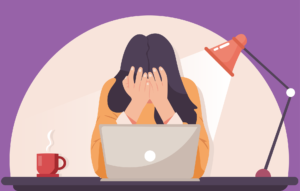
On April 27th, 2022, Dr. Anthony Fauci – Chief Medical Advisor to the President of the United States – announced that the country is out of the pandemic phase. The epidemic that engulfed the world on March 11th, 2020, had stepped on a brake. People took off their masks and headed to school, to work, and to the life they were deprived of for 777 days. Under the deceptive appearance where things are going back to normal, the aftermath of the COVID-19 pandemic quietly erodes people’s lives and negatively impacts everyone, and graduate students will not be the exception. The effects of such corrosion will progressively infiltrate from the start of their program and extend into the days after graduation.
Research funding is the first to be affected. A survey studying the impact of COVID-19 on the research communities conducted by the National Institutes of Health (NIH) during the pandemic has shown that over 70% of the doctorate-granting universities reported being very or extremely concerned that the financial repercussion of COVID-19 would jeopardize the universities’ main research function. Their disquietudes were not groundless. Since the epidemic, the NIH – the primary funding source of health sciences in the United States – only received a 3% funding increase in the fiscal year of 2021. The obstacle aggravates in the fiscal year of 2022 where nearly all the projected budget will go toward the newly-established NIH institutes. Most of NIH’s previously-existing 27 institutes will remain flat during the post-pandemic fallout, being left with little support to combat the biomedical inflation and struggles to keep making progress in research.
With financial hardship becoming a key concern of universities to maintain their research function, graduate students within their training programs are also trying to make peace with the situation. Aside from the cash crisis with wages that do not cover living costs, young researchers at all phases of their studies are getting despondent over troubled research productivity and recovering mental health.

While the graduate school experience is exciting and gratifying, transitioning into the working environment and the mindset of a scientist-in-training can be delicate even without a global pandemic exacerbating it. Early in 2018, a study on factors that influence doctoral students’ completion, achievement, and well-being pointed out that departmental structure and supervisory mentorship affects the research progress and well-being of the students. The whirlwind coronavirus disrupted the normal routine for departments and principal investigators into a novel, blended mode of work mixed with adjustments and uncertainties. The lack of clarity and the increasing inconsistencies – masked under the shadow of a pandemic – shapes a more confounding environment for students to adapt. Meanwhile, the frustration and dissatisfaction with regard to such external factors gradually develops into mental distress that results in identity crisis, with students questioning whether they should be in graduate school or if they are good enough.
Adapting to a capricious graduate study experience is challenging, but for senior graduate students who witnessed the shift of dynamic from the sideline, the contrast between pre- and post-pandemic is difficult to get used to. The temporary closure of the lab and backordered supplies have delayed their progress of research. The National Science Foundation (NSF)’s rapid response research surveyed graduate student experience during COVID-19 and revealed that approximately 30% of graduate students working on research projects have extended their project timelines. Meanwhile, the loss of in-person interactions, cancellation of conferences, and unpredictable changes in laboratory dynamics are discouraging. The dejection extends for senior students close to graduation. Cloudy job prospects have long been one of the top worries for doctoral students. While academia remains the first choice for a career for over half of the graduating class, the coronavirus-triggered recruitment halt among worldwide institutions resulted in a plummet of job-openings, leaving fresh PhDs with a career calamity and loads of uncertainty.
When the negatives of stress and uncertainty outweigh the positives from research under the backdrop of a global pandemic, students are losing their resilience and struggling with depression and anxiety. Over two-thirds of the students are reporting low well-being and high levels of anxiety due to these shortfalls. While the aftermath of the pandemic will take a long time to untangle – with work from the legislations and administrations – there are still little things students can do to feel better day by day.

Validate your feelings. Embracing one’s internal experiences, feelings, and thoughts is the gateway to self-reconciliation, which helps one to calm down and leads to a stronger sense of identity that effectively manages intense emotions. The coexistence of self-validation and identity formation is crucial for the wellbeing of doctoral students to prevent emotional dissonance.
Focus on what you can control and act. The value of need for control drives the perception of self-efficacy and supports the sense of success. However, one’s obsession over things that are outside of one’s power can result in a vicious cycle: worry, attempt to gain control, fail, ruminate, and repeat, resulting in higher levels of anxiety and distress. Practicing a realistic sense of control is not only useful in regard to the pandemic, but also helps one cope with academic pressure to ease the lack of felt accomplishment and the emotional exhaustion.
Remind yourself of why you are here. The authors of the book 57 Ways to Screw Up in Grad School: Perverse Professional Lessons for Graduate Students pointed out that understanding one’s motivation for graduate studies is not just important during the application phase, but also crucial throughout one’s entire training to counter fatigue and burnout. While it is easy to list the downsides of the graduate school experience, it takes just as little time to write down one’s motivations for being there to maintain focus through the challenges of graduate school and beyond one’s career.
You have got to laugh. One constant fact with graduate school is that a student will feel challenged, stressed, embarrassed, and frustrated. Rather than dwelling on negative emotions, a sense of humor remedies tension and surmounts problems. Humor modulates the reward centers in our brains to improve psychological and somatic functioning. The simple act of watching a comedy or reading a comic strip – either for procrastination or decompression – can help one handle all of the unexpected in graduate school.
* If you are or know someone in crisis, the National Suicide Prevention Lifeline (Lifeline) is 1-800-273-TALK (8255). The Crisis Text Line is also available by texting HELLO to 741741. Both services are free, confidential, and available 24 hours a day and seven days a week. Please know that you are not alone.
Peer editor: Honoreé Brewton